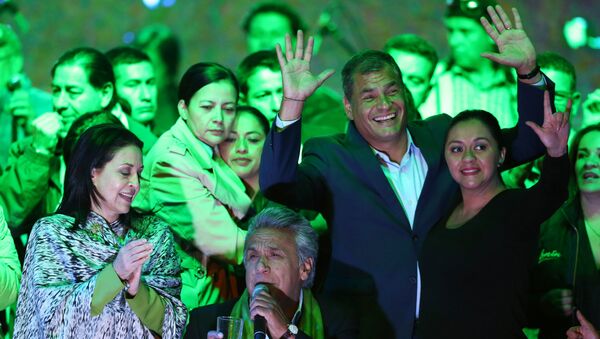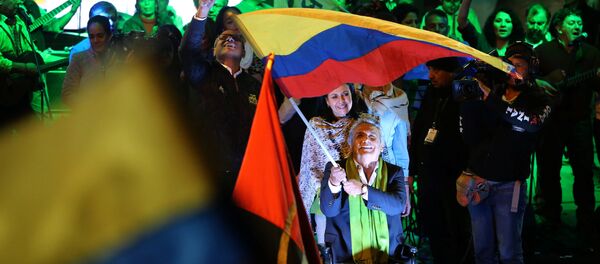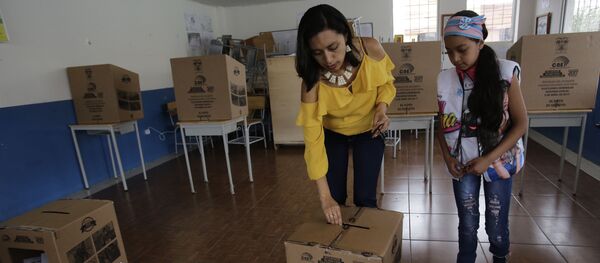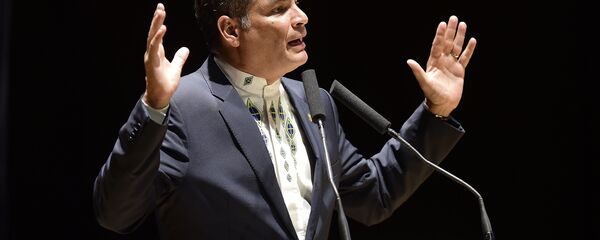Having processed over 98% of the votes from Sunday's vote, Ecuador's National Electoral Council reported that former Vice President Lenin Moreno is leading over right-wing contender Guillermo Lasso by a margin of 51% to 49%, following a close and highly contentious runoff race.
"This is great news for the Patria Grande [a concept of a shared community for Spanish America]: the Revolution has returned to victory in Ecuador. The right has been defeated, in spite of their millions and the media," Correa tweeted.
Gran noticia para la Patria Grande: la Revolución volvió a triunfar en Ecuador.
— Rafael Correa (@MashiRafael) 3 апреля 2017 г.
La derecha derrotada, pese a sus millones y su prensa.
"Lenin is president!!!" he added in a second tweet, pointing to the two point difference between the candidates. "The moral fraud of the right wing won't go unpunished," he added.
Resultados oficiales CNE: más de dos puntos de diferencia...¡Lenín presidente!!!
— Rafael Correa (@MashiRafael) 3 апреля 2017 г.
El fraude moral de la derecha, no quedará en la impunidad.
The president has reason to celebrate. Sunday's win means that Correa, who will complete his term next month, will be able to pass on the political and economic course he launched in the mid-2000s, when a coalition of left-wing parties led by Correa came to power and began the so-called 'Citizens' Revolution', aimed at building socialism in Ecuador.
By contrast, Lasso, a former banker, had effectively promised to abolish the country's leftist course, vowing to cut taxes, cut spending, and promote foreign investment, and to create a million jobs in four years. He also promised to kick WikiLeaks founder Julian Assange out of the Ecuador's Embassy in London, where the activist has taken refuge since 2012 amid fears of extradition to Sweden or the US on trumped up charges of sexual abuse.
Moreno's win prompted Assange to do a bit of trolling of his own on Twitter, where he 'cordially inviting' Lasso to leave the country within 30 days. "I cordially invite Mr. Lasso to leave Ecuador within 30 days (with or without his tax haven millions)," the activist wrote, mimicking Lasso's language about 'cordially inviting' Assange to leave the Ecuadorian Embassy in 30 days in the event that he became president.
Invito cordialmente al Señor Lasso que se retire del Ecuador en los próximos 30 días (con o sin sus millones offshore) #AssangeSILassoNO pic.twitter.com/yYvw5vBWST
— Julian Assange (@JulianAssange) 3 апреля 2017 г.
After hearing of Moreno's victory, protests and violence broke out in several cities, including outside the National Electoral Council building in the Ecuadorian capital of Quito, where police clashed with protesters.
Correa rushed to accuse the opposition of trying "to achieve through violence what they have not achieved in elections." Government supporters, including the president and president-elect, gathered their own supporters, singing patriotic and revolutionary songs including the famous Chilean left-wing hymns Venceremos ('We will win') and El pueblo unido jamas sera vencido ('The people united will never be defeated').
Speaking to RIA Novosti about the election results and the tense situation in the country, Lyudmila Okuneva, Latin America expert and professor at the Moscow State Institute of International Relations, said that the opposition's demands for a recount could have been predicted, given the close margin in the vote. At the same time, she stressed that at this point there is no actually proof of voter fraud.
The election results demonstrate the country's political split, Okuneva said, although she doesn't expect the protests to escalate into anything more serious.
Dr. Lazar Heifetz, Latin America expert and professor at St. Petersburg State University's faculty of international relations, warned that the country is facing a very tense situation at the moment, and it remains to be seen how the situation will unfold in the days to come.
"The numbers are very close. The margin is very thin," the expert noted, speaking to Russia's Vzglad newspaper. "It's natural that the opposition, which…had invested a great deal of money, used its media resources, and still lost, found the result upsetting. In many Latin American countries, it has become characteristic for half of the country to support the authorities, and the other half the opposition." Heifetz classified the situation as 'very strained'.
In any case, the expert emphasized that the outcome of Sunday's vote was important for Latin America as a whole.
"Ecuador is one of the few countries of the so-called leftward turn [of the 2000s] where this left turn has been preserved," he said. In Brazil and Argentina, Heifetz recalled, the Left were recently ousted, in elections in Argentina's case, or following the left-leaning president's impeachment in Brazil's. Ecuador, Heifetz said, has shown that some of the potency of the Latin American left turn of the 2000s has survived.






